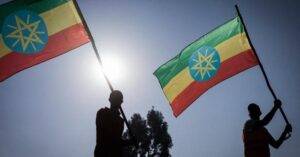Imagine you can relive your younger self from seven years back. Wouldn’t that be exciting and interesting at the same time? All you have to do is travel to a different country; voila, things are done. Wondering how? Book your tickets to Ethiopia and participate in such an amazing event. The Ethiopian calendar will help you with the same.

But you must be thinking, Why is Ethiopian calendar behind by 7 years? Well, for that, there is a specific reason. While the rest of the world abides by the famous Gregorian Calendar and welcomes the new year on the 1st of January, the Ethiopian calendar is different. The calendar of Ethiopia is based on the idea of the Coptic calendar. Where the new year begins on the 11th of September. The reason behind such a difference goes back to the disagreement with the birth of Jesus Christ. It is the only place on Earth where the Roman Catholic Church gets opposed by the Orthodox Church of Ethiopia.
Ethiopian calendar vs Gregorian calendar
If you are wondering, what year is it in Ethiopian calendar right now? Subtract seven years from the present date, and you will get to know. Moving on to the difference between the Ethiopian and Gregorian calendars, the former calculates Jesus’s conception, while the latter abides by the birth year. Read on, and you will get to understand the further differences:
The Ethiopian Calendar
- The Ethiopian Calendar stands similar to the Julian calendar, which is termed the successor of the modern-day Gregorian calendar.
- According to the Ethiopian Calendar, there are 13 months. While the 12 months have 30 days and the last month has 5 days. It becomes 6 during leap years.
- The last month of the year is known as Pagume.
- Astonishingly, while the entire world was celebrating the turn of the millennium in 2000, Ethiopia celebrated the same in 2007.
- This brings us to another conclusion: the country has various public holidays on different dates than the rest of the globe.

- Here is a list of the Ethiopia calendar months:
Month 1: Meskerem
Month 2: Tikimt
Month 3: Hidar
Month 4: Tahsas
Month 5: Tir
Month 6: Yakatit
Month 7: Magabit
Month 8: Miyazya
Month 9: Ginbot
Month 10: Sene
Month 11: Hamle
Month 12: Nehasa
Month 13: Pagumiene - Now that you know the Ethiopia 13 months name, let’s help you out with the seasons as per the calendar. The country has three different seasons, known as
Bega (from October till January)
Beig (it starts in February and stretches till May)
Kiremt (the month expands from June to September)
The Gregorian Calendar
- The Gregorian calendar is a solar calendar with 12 months. It has 52 weeks for regular and 53 weeks for occasional events. A day typically starts on Monday, and Sunday is the last.
- 1582 marks the introduction of the Gregorian calendar by Pope Gregory XIII. before that, it was the Julian calendar put into operation by Julian Ceaser in 46 BC. However, the calendar did come with a flaw, where the solar year’s length was miscalculated by 11 minutes. That way, every year, the celebration date for Easter and Spring Equinox grew apart.
- The system of the Gregorian calendar is still off by 26 seconds. So as per the explanations, by the year 4909, the Gregorian calendar will be an entire day ahead of the solar year.
- The Gregorian calendar is of no use in astronomy because of the presence of a 10-day-long hiatus in it. So to calculate positions, backward astronomers do use the Julian calendar.
- Shifting to the Gregorian calendar from the Julian made countries give up on several days. For example: On 4th October 1582, the Gregorian calendar became official. Now because people earlier were following the faulty Julian calendar, which had already fallen behind, they had to give up 10 days to readjust the dates. So now the people straight woke up to October 15th. England (1752), Alaska (1867), Russia (1918), and Greece (1923) did witness a similar situation in switching to the Gregorian calendar.
The reason behind the continuation of the Ethiopian calendar
If one goes back into the history of Ethiopia, it is the only country from Africa to have never undergone colonization. However, in 1895, Italy did try to invade the same, but their expeditions underwent massive defeat by the forces of Ethiopia or then known as Abyssinia.
After a year, Italy went back and was able to get hold of the highlands by the coast. This was only possible because there was confusion following the death of emperor Yohannes IV in 1889. Following this tragic incident, Italy did try to push further within Ethiopia, it faced defeat in the battle of Adwa.

On 1st March 1896, under the command of Emperor Menelik II, Italian troops faced defeat. A treaty guaranteeing Ethiopian independence was signed. But years later, Benito Mussolini did violate the same, taking charge of the country for five long years.
Another possible reason for Ethiopia to continue with the Coptic calendar is the difference of opinion about the date of birth of Christ. The Orthodox Church of Ethiopia and the Roman Catholic Church could not agree on the same, which led to the use of different calendars. That way, Christmas is celebrated on the 7th of January in Ethiopia, while the Gregorian calendar still stands on the 25th of December, marking Christmas day.
List of various calendars worldwide
Here is a list of the various calendars from different parts of the globe
- Hindu Calendar
- Jewish Calendar
- Islamic Calendar
- Buddhist Calendar
- Chinese Calendar
- Persian Calendar
- Mayan Calendar
So isn’t the facts stated here interesting? Now that you know, Which country is behind in years? Are you planning on a visit to the same?
Also, share your thoughts about the Ethiopian calendar and its exclusivity in the feedback section. If you are a History geek, check out other blogs from different parts of the globe as relevant.



